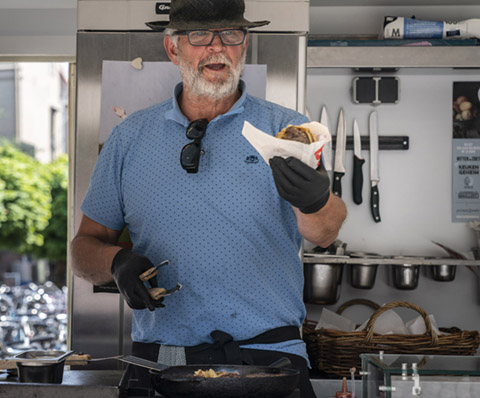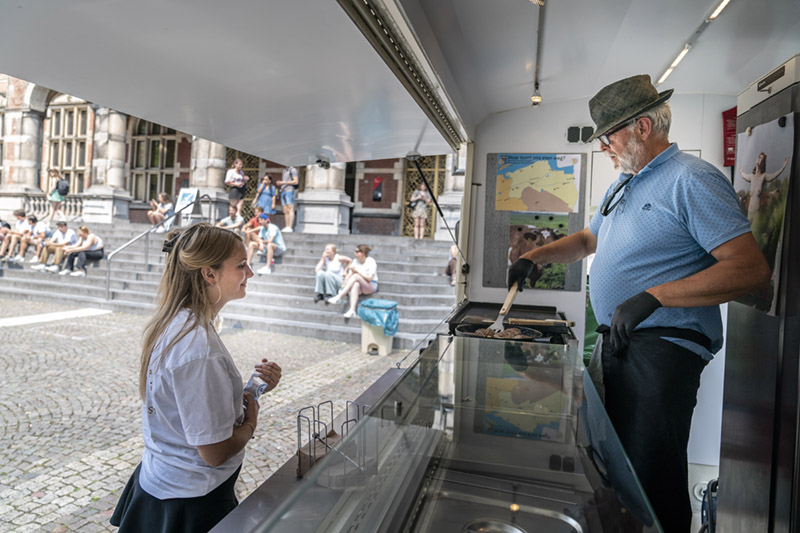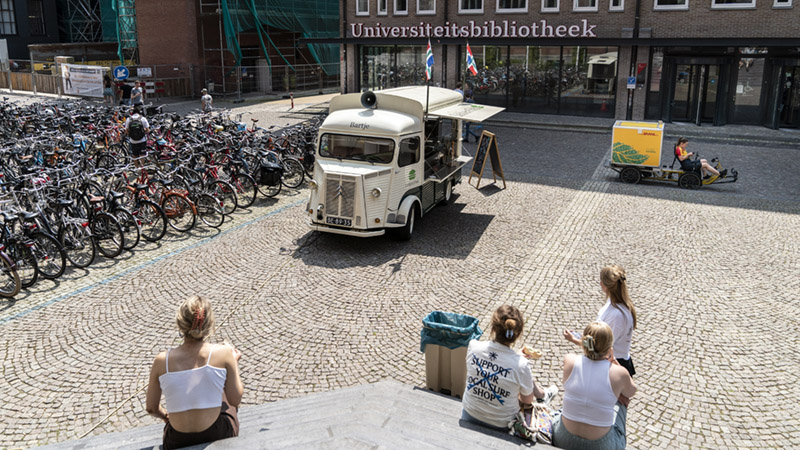
A history student with a food truck
‘I love cooking
good food’
During the first few minutes of our phone interview, it immediately becomes clear that Van Vliet is much more than a history student who owns a food truck. ‘I’m just putting some eggs into the incubator’, he says.
This morning, one of his thirty chickens left her nest, which still had six fertilised eggs in it. Normally, a mother hen will patiently wait for all the eggs to hatch, but ‘another chicken would sometimes lay her eggs in this nest, too’. When too much time elapses between hatchings, the chicks that hatched first start to get hungry.
‘The mother will leave the nest after a day or two to find food for them. So I’m putting them in the incubator so they’ll hatch, and then they can go back to their mother.’
He and his wife own three hectares of land in Friesland, where in addition to chickens, they also tend to goats, ducks, sheep, turkeys, and dogs.
Their livestock are all ancient, Dutch breeds: from call ducks to Drenthe heath sheep, and from Twente geese to red Ardennes turkeys. ‘I think it’s important to keep these ancient breeds alive’, he says enthusiastically.
Mash
His love for good, local food didn’t come from his childhood, he says. ‘I grew up in a family with nine children, where we mostly ate mash. I was always peeling potatoes, can you imagine? Three to five kilos every day?’ he says, laughing.
I think it’s important to keep these ancient breeds alive
It was during his marriage that his love for food truly blossomed. ‘My wife and I are both good cooks and we love having people over’, he says. Early in his marriage, he would still buy cheap meat at the supermarket, but over the years, he learned about the value of food. ‘It all started at the academy of culinary history, where I was taking a course. It was so interesting that I wanted to learn more about it.’
He started out by doing his own research. But when he turned fifty and had lived at the farm for five years, he wanted more. ‘All my life, I said I wanted to study history so I figured, it’s now or never.’
In 2009, he enrolled as a part-time history student, focusing mainly on the culinary history of Friesland.
Potato
For his bachelor, he wrote a thesis on the potato and the demographic development in Friesland and Flanders between 1750 and 1850. ‘It turned out the population had doubled in those regions. All because of the potato. No one had made that connection before.’
It’s one of the many discoveries Van Vliet made in his search for a culinary life. ‘Along the line, I became increasingly concerned about our planet and how we’re treating it’, he says. ‘I figure the best thing we can do is eat seasonal products that are farmed close to home.’
He realised he had an opportunity to propagate this message outside his work, the farm, and his studies: a food truck.

Photo Reyer Boxem
Street revolution
‘I was inspired by the street food revolution by Richard Johnson’, he says. ‘We don’t really know that much about good food in the Netherlands, when there are so many manufacturers selling fantastic products.’ Johnson gave him the idea to try and seduce ‘ordinary people’.
The best thing we can do is eat seasonal products that are farmed close to home
‘If people eat better street food, they’ll start eating better at home, too’, says Van Vliet. Together with his son, he created LekkereTrek: a food truck that travels the north of the Netherlands and sells only locally produced foods, such as hamburgers from Red Pied Frisian cows.
‘I like to tell people something about what they’re eating while they’re eating it’, he says. ‘For example, that Red Pied cows are a very old race, that there are only 750 of them left and it’s important to eat them so they’ll continue to exist.’
That might sound a little counterintuitive. But as Van Vliet explains, if a farmer makes no money on his livestock, they’ll die out. ‘Which would be a shame, since they’re dual-purpose cows: they can be used both for dairy and for meat.’
Food culture
As self-appointed ambassador of northern Dutch products, Van Vliet is passionate about teaching as many people as possible that they don’t have to go far away for good food.
In fact, other countries can teach us a lot. ‘If you ask an Italian person from Piedmont where they’re from, they’ll tell you they’re Piedmontese, rather than Italian. And his diet is Piedmontese.’
The food culture is so ingrained over there, he says, that people are proud of it. He would love to see the same thing here in the north. ‘I can name twenty northern cheese farmers off the top of my head who can easily compete with Italian cheeses.’
So why would we import things from far away, polluting the earth, when there’s so much good stuff right here?
Maybe for the same reason that Frisian nobility summoned French chef Vincent La Chapelle to the stadtholder’s court in Leeuwarden: to add to the stadtholder’s prestige.
This is something Van Vliet researched for his master thesis. As he studies the threads of the past, he hopes to convince people in the future of the value of good, local food.

Photo by Reyer Boxem